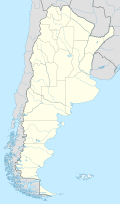Ischigualasto Provincial Park facts for kids
Quick facts for kids Ischigualasto Provincial Park |
|
|---|---|
| Parque Provincial Ischigualasto Valle de la Luna |
|
| Location | San Juan Province, Argentina |
| Nearest city | San José de Jáchal |
| Area | 60,370 ha (233.1 sq mi) |
| Established | November 3, 1971 |
| Official name: Ischigualasto / Talampaya Natural Parks |
|
| Type: | Natural |
| Criteria: | viii |
| Designated: | 2000 (24th session) |
| Reference #: | 966 |
| State Party: | |
| Region: | Latin America and the Caribbean |
Ischigualasto Provincial Park is a special protected area in San Juan Province, located in north-western Argentina. Many people call this park Valle de la Luna (which means "Valley of the Moon"). It got this name because its landscape looks like the surface of the Moon or another planet!
This park is home to a unique rock area called the Ischigualasto Formation. This same formation also stretches into the nearby Talampaya National Park in La Rioja Province. The Ischigualasto Formation is incredibly important because it holds many fossils from the Triassic period. These fossils include some of the oldest known dinosaur remains ever discovered!
In the year 2000, UNESCO recognized Ischigualasto as a World Heritage Site. This means it's a place of great natural importance that should be protected for everyone to enjoy and learn from.
Contents
Discovering Ischigualasto Park
Ischigualasto Provincial Park was created on November 3, 1971. It covers a large area of about 60,370 hectares. That's like 600 square kilometers! The park is a protected area, which means its unique environment, plants, and animals are kept safe.
The Valley of the Moon
The park's nickname, "Valley of the Moon," describes its amazing landscape. You'll see strange rock formations that have been shaped by wind and water over millions of years. Some rocks look like giant mushrooms, submarines, or even sphinxes! These natural sculptures make the park feel like a different world.
Ancient Life: Triassic Fossils
Ischigualasto is one of the most important places in the world for studying the Triassic period. This period happened about 252 to 201 million years ago. It was a time when the first dinosaurs started to appear on Earth.
Dinosaur Discoveries
Scientists have found many fossils of early dinosaurs and other ancient reptiles here. These discoveries help us understand how dinosaurs evolved and what the world was like millions of years ago. The fossils found in Ischigualasto are incredibly well-preserved. They give us clues about the plants and animals that lived during the Triassic period.
The Ischigualasto Formation
The Ischigualasto Formation is a layer of rock that holds these amazing fossils. It's like a giant history book made of stone. By studying these rocks and fossils, scientists can learn about ancient climates, environments, and the creatures that roamed the Earth long before humans existed.
World Heritage Site Status
In 2000, UNESCO declared Ischigualasto a World Heritage Site. This honor is given to places that have outstanding universal value. It means the park's natural beauty and scientific importance are recognized globally. This status helps protect the park and its treasures for future generations.
Images for kids
-
Water-eroded badlands
See also
 In Spanish: Ischigualasto para niños
In Spanish: Ischigualasto para niños
 | Shirley Ann Jackson |
 | Garett Morgan |
 | J. Ernest Wilkins Jr. |
 | Elijah McCoy |







